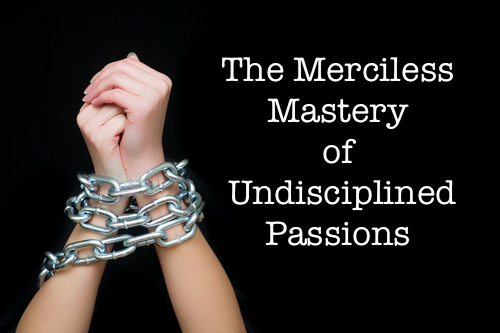 I know it is a bit “old-fashioned” and it may be hard for those of this generation to understand, but the timeless message of the Faith is that we are called to battle and tame the passions SO THAT they are our servants and never our masters! So what are the passions? Some may say “I thought being a passionate person was a good thing.”
I know it is a bit “old-fashioned” and it may be hard for those of this generation to understand, but the timeless message of the Faith is that we are called to battle and tame the passions SO THAT they are our servants and never our masters! So what are the passions? Some may say “I thought being a passionate person was a good thing.”
Well, as usual, it depends on definitions. As an aside, this is why a passive practice of the Faith is so very dangerous. It’s just too easy to let important truths slip away when you’re not paying attention to details!
An ancient understanding of “passion” is the idea of “suffering.” The Lord’s crucifixion is said to be His “Passion.” Passions are those forces in your life that desire to run your life. They are “feelings” and “desires” and “hungers” and habits that are just waiting for the moment to cause you to suffer the consequences of allowing these passions to master you. A traditional list of the passions is:
- Gluttony
- Lust
- Avarice
- Anger
- Despondency
- Despair
- Vainglory
- Pride
Look at our lesson today in Matthew 14:1-13:
At that time, Herod the tetrarch heard about the fame of Jesus; and he said to his servants, “This is John the Baptist; he has been raised from the dead; that is why these powers are at work in him.” For Herod had seized John and bound him and put him in prison, for the sake of Herodias, his brother Philip’s wife; because John said to him, “It is not lawful for you to have her.” And though he wanted to put him to death, he feared the people, because they held him to be a prophet. But when Herod’s birthday came, the daughter of Herodias danced before the company and pleased Herod, so that he promised with an oath to give her whatever she might ask. Prompted by her mother, she said, “Give me the head of John the Baptist here on a platter.” And the king was sorry; but because of his oaths and his guests he commanded it to be given; he sent and had John beheaded in the prison, and his head was brought on a platter and given to the girl, and she brought it to her mother. And his disciples came and took the body and buried it; and they went and told Jesus. Now when Jesus heard this, he withdrew from there in a boat to a lonely place apart. But when the crowds heard it, they followed him on foot from the towns.
Of course, we know the story of the Beheading of St. John the Baptist well, but what a powerful lesson of the prison and the danger of unbridled passion! Herod was mastered by his passion and was enslaved to do what he really didn’t want to do. But that’s the nature of untamed passions. They enslave us and master us when the reverse is the intention and the purpose we were made to experience.
Listen to this quote from Fr. John Chryssavgis: “Passions are our inner sounds, those deep marks in the space of our heart that require healing… our passions indicated not so much that we are doing something wrong, but that we are not in control.” (In The Heart of the Desert) That’s spot on! The passions aren’t so much us doing bad things or having bad thoughts as much as their being our master shows us that we are out of control. We become the slaves of our passions when we fail to appreciate how to properly discipline our passions. Just like a powerful and beautiful horse isn’t very helpful when it’s wild, so our passions meant to be our servants, run roughshod over us when we don’t discipline them. What was meant to serve us becomes our master and destroys us!
It is why the whole of the Faith is geared toward training us how to tame these passions so that they will be for our good and not our destruction. The fasts, the disciplined prayer rule, the cycle of liturgies, the theology, the moral wisdom, and the Divine Mysteries, all work to help us bridle these wild passions and make them what they were meant to be – gifts that enrich us rather than addictions that destroy us.
St. Emiianos of Bulgaria was from Dorostolum in Thrace, the servant of a certain pagan in the days of Julian the Apostate (361-363). As a fervent Christian, Emilian completely rejected the error of the pagans, and one day entered the temple and broke all the idols with a hammer. The rulers didn’t know who had done this and when Emilian saw others were being punished for doing this, he gave himself up of his own accord. He was mercilessly whipped, then cast into a fire, in which he gave up his soul without his body suffering harm. His disciplined passions also allowed him peace when pain was overwhelming and he did not allow temporary suffering to pull him away from Christ!
Today, are your passions under control? Are you actively learning how to master your passions and watch as these passions are transformed into gifts? All of this wisdom lies within your grasp. It’s time to proactively embrace the wisdom of the Faith to enable you to be who you really are, not as the passions make you appear! It’s time to be Orthodox on Purpose!
P.S. O divine Emilian, since zeal for God burned within you, you were not afraid of fire, your fellow creature and servant; fearlessly and of your own will, you went forward and was not consumed therein by the flames’ hot fury, as a sacrifice to Christ God, O glorious martyr; pray that we all may be saved.


